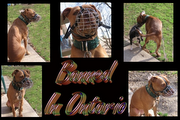Frankie...The Gentleman Pit Bull
In the The Albuquerque Tribune
Real Life Role Models: A perfect gentleman
By Erik SiemersTribune Reporter November 21, 2005
Frankie the therapist meets with the women each day.
They've been homeless and victims of some form of abuse. They seem to find comfort in Frankie.
They can talk to Frankie. He listens to them. His support is unwavering.
In many ways, he's like them. 
Frankie the therapy dog sidles up to residents gathered for a therapy session at Tierra del Sol, a residential treatment program for homeless women. Frankie often sits in with residents to provide comfort during stressful and emotional sessions. (Stacia Spragg-Braude/Special to the Tribune)
The women and Frankie are each subject to stereotypes. They've all been through hardships and abuse. They've traveled a long, hard road to where they are now.
It's serious work for therapist Frankie.
"He takes it very, very seriously," says Rutledge Beard, herself a case manager and therapist who just happens to be Frankie's owner.
Frankie the therapist is also Frankie the American Staffordshire Terrier - one of the breeds commonly known as pit bulls.
A certified therapy dog, 3-year-old Frankie is a daily fixture at Tierra del Sol, a northwest Albuquerque residential treatment program for homeless women run by Albuquerque Health Care for the Homeless.
The facility houses, at the moment, 14 women and five of their children. They stay an average of nine months, learning how to break patterns of substance abuse and rebuild their independence.
The dog with eyes that match his caramel-colored coat is himself a castoff.
At just over a year old he was found on Louisiana Boulevard by the wife of Beard's veterinarian.
He had been thrust from the back of a pickup and dragged by a trailing camper.
Meanwhile, the pickup with California plates rolled on, Beard said.
"Several vets pieced him back together," she said.
Frankie is now certified by the Delta Society, a Bellevue, Wash.-based group that has registered 8,000 teams of therapy animals and owners across the world.
In Frankie, the women have a constant friend and someone to talk to without ever judging them, Beard said.
"He's like a big buddy," Beard said. "A lot of the women have only had negative touch in their lives."
Women who refused to communicate with other adults would instead open up to Frankie, Beard said.
Residents with nothing to give would find a way to give treats to Frankie.
He takes naps with them, waits for them on green lawn chairs outside their apartments, and nuzzles his heavy, muscular body against them when he hears them become agitated.
But in his own way, he's a role model exemplifying how stereotypes can be wrong.
He's just one of 22 pit bull breeds to be a certified therapy animal, Beard said, an achievement that seems to shatter notions about the breed being among the dog world's most dangerous.
"Theories about them being out of control or loaded guns aren't true," said Beard of Frankie, the pink-nosed dog that's scared of her two chickens.
Jesus Rivas, a Columbus, Ohio-based documentary filmmaker, used Frankie as a vehicle for a film aiming to show that so-called dangerous dogs aren't always dangerous.
Rivas, who has worked with National Geographic, hopes to shop the unfinished film both to his old employer and places like the Animal Planet network.
"One thing I tried to push in the film is not only that dogs are not that dangerous," he said, "but also that we need to realize they don't know how to speak our language. They have a dog language that is different from our language. Their language is a symbolic, physical language."






























2 comments:
What a great story! I'm glad that guy is making a documentary, I can't wait to see it!
I hope it shows in Canada. ESPECIALLY in ONTARIO!!! And all the places that have the BSL!!! I would be so GOOD to hear the positive side.
Post a Comment